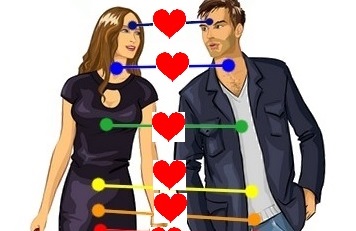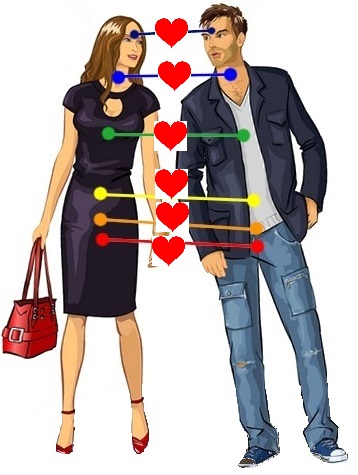Value #1 of 12 Values for Integral Relationship Evolutionaries:
We choose to love instead of something that happens to us or that we attract.
A few weeks after publishing Integral Relationships: A Manual for Men in 2010, I received a flyer with “10 Core Values for Evolving Women” which you can read here. These 10 Core Values inspired me to suggest 12 Values for Integral Relationship Evolutionaries that would end patriarchy through co-created love relationships between partners with equal rights and responsibilities.
In this and subsequent newsletters I will outline my reasoning behind each of the 12 Values and invite your feedback and discussion at www.facebook.com/integralrelationship.
In his book The Art Of Loving (1956), Erich Fromm writes: “Is love an art? Then it requires knowledge and effort. Or is love a pleasant sensation, which to experience is a matter of chance, something one “falls into” if one is lucky? This little book is based on the former premise, while undoubtedly the majority of people today believe in the latter… Most people see the problem of love primarily as that of being loved, rather than that of loving, of ones capacity to love. [For them] the problem of love is the problem of an object, not the problem of a faculty. People think that to love is simple, but that to find [or attract] the right object to love–or to be loved by–is difficult.”
The first question that value #1 raises is how much choice or free will humans have in general, and to love in particular. It has been the subject of much philosophical and psychological debate.
In my experience, people can only choose to love up to their level of consciousness–from what is available to them. A person at an egocentric level of development cannot simply choose to love at a conformist, rational, pluralistic or higher level. Another factor is our level of psychological health and spiritual realization. Narcissistic people, including many New-Agers who primarily focus on loving themselves, as they believe that everyone “creates their own reality” and is “whole and complete in themselves”, cannot choose to love another person. As Eckhart Tolle noted: “The Ego cannot love, it always wants something.” Similarly, people with personality disorders or deeper psychological wounds cannot choose to love either.
The second question is, what do we mean by love in this context. I suggest: “The capacity/faculty and will to extend one’s self in a supportive, nurturing and compassionate way for the benefit of another and the realization of her/his full potentials.”
In an Integral Love Relationship, this extending of the self is mutually balanced and harmonized between psychologically healthy (or healing) and spiritually awake(ning) opposite and equal partners at the level of the first six chakras (assuming that there is no duality at the seventh chakra.) In other words, the love relationship is co-created in the “we-space”, “third body” or “lower quadrants” between two compatible people who are sexually, intellectually, emotionally and spiritually attracted to each other, and who are (within reason) equally giving and receiving at each level, and not something that happens to them, they “fall into”, or that they attract. Love emerges in the space where two subjects and objects come into co-creative contact–all the way up and all the way down.
Traditional and modern love relationships often get reduced to an exchange between the first and second chakra–money and status for sex; females instinctively using their sexual power, and males their physical and/or financial power, to get what they want.
As Fromm observed: “In pursuit of this aim [to be loved and lovable] people follow several paths. One, which is especially used by men, is to be successful, to be as powerful and rich as the social margin of one’s position permits. Another, especially by women, is to make oneself attractive by cultivating one’s body and dress, etc.” In post-modern relationships, which emerged since Fromm’s writings, emotional availability (meaning that men understand and adequately respond to women’s feelings, and act in a sensitive yet strong way with integrity) gets added into the mix.
In a post-postmodern Integral Evolutionary Relationships, both partners equally:
- Contribute financially to their mutually chosen lifestyle and share chores around the house–despite a recent study that “husbands who share household chores miss out on sex” because “the division of housework doesn’t align with an “exchange model” where chores are traded for a share of income, for example, or sex.”
- Engage in mutually nurturing, healing and pleasurable sacred sexuality.
- Use primary emotions and power struggles for ongoing healing, growth, creativity and synergy.
- Reveal feelings in a self-validating way by owning them and staying in empathic presence with the feelings of their partner without judgment.
- Communicate their experiences, thoughts, values and intentions with each other, and harmonize their subsequent actions by expressing what is good, true and beautiful (making validity claims to rightness, truth, and truthfulness).
- Share a higher vision and purpose for their relationship that serves the greatest good for the largest number of people and all creation.
This kind of co-created love relationship along the six chakras between equal and opposite partners does not imply sameness. Healthy feminine and masculine polarities at each level are cultivated and played with to create attraction and synergy (Value #6.) And there are times of one-sided giving and receiving, e.g. during sexual play, pregnancy, child rearing, illness, continuing education, career changes, outside threats, hardship, breakdowns, or other special circumstances. But overall, a focus on co-creating a loving relationship between partners with equal rights and responsibilities is seen as the future of healthy, sustainable integral love relationships and hence humanity.
In the next newsletter I will unpack value #2 “We see the depth of our heart and soul connection as well as the level of humility and devotion to our relationship as an indicator of our psychological health and spiritual realization.”
Visit www.integralsingles.com if you are single and want to find a partner for an Integral Relationship. Contact me for a consultation if you want support for co-creating an Integral Relationship.


